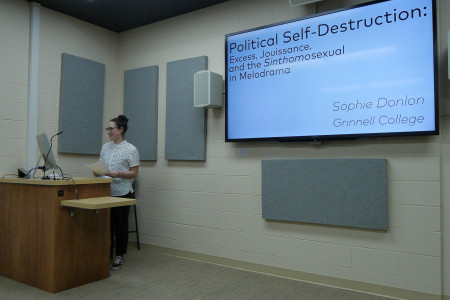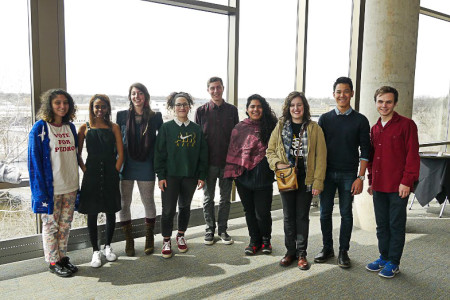Lily Bohlke, Copy Editor
bohlkeli@grinnell.edu
From April 1 to 3, Lawrence University hosted the Associated Colleges of the Midwest (ACM) Film Festival and Conference to allow students from ACM colleges to present their work and learn from each other as well as other professionals. At this year’s Conference, Michelle Risacher ’17 won first prize for her paper, Simone Downs ’17 won third prize for her paper and Saw Min Maw ’16 won second place for his short film.
The conference was judged by esteemed film industry professionals: television agent Alan Berger; executive series developer, producer and casting director Phyllis Berger; actor, writer and producer-director Garrett Brown and documentary filmmaker, MacArthur Foundation Fellow and Scribe Video Center founder Louis Massiah.
Risacher’s paper examined Julia Kristeva’s theory of “women’s time”—time in a more cyclical fashion as opposed to the western linear conception of time—through an incomplete film, “Witch’s Cradle,” made by Maya Deren, a surrealist avant-garde filmmaker.
Downs’ paper is a semester-long study on the 1958 Anna Lucasta that examines how the film renders a cinematic representation of the “ideal” Black American subject as assimilative and that of an immigrant’s experience in the United States.

Photo contributed.
Saw Min Maw made a short film with two students from Johns Hopkins while abroad at the Film and TV School of the Academy of Performing Arts in Prague. It was shot on a 35-millimeter camera and is about a mother and daughter reconnecting as the mother is brought to a nursing home.
The three Grinnellians who were recognized for their excellent work managed to create their respective pieces despite a disadvantage in comparison with other ACM colleges: the lack of a film department.
Professor Theresa Geller, English, who specializes in film theory, said that Grinnell students who opt for an independent Film Studies major have done incredibly well at national conferences for years.
“I’ve been promoting my students’ successes for eight years, and we still don’t even have a minor,” Geller said.
Although Grinnell does offer some film theory classes, the College does not offer any film production classes. Saw Min Maw said that he had to learn everything he knows about making films through other outlets.
“Before Grinnell, I worked for two years at a social enterprise called Proximity Designs. That’s where I started learning everything I know about film and photography and editing and the basics of filmmaking,” he said. “I had an inkling I wanted to do film studies. I came to Grinnell and started doing an independent major.”
Geller hopes to bring more film classes and ultimately a film program to Grinnell. A few years ago, Geller brought a filmmaker from the University of Iowa to the College to teach a short course on film production.
“I’m hoping that [a film program] will come by talking about my students’ successes,” Geller said. “It’s amazing that the majority of paper presenters were Grinnell students. Of all those Midwestern colleges part of the ACM, our filmmaker was runner up and our writer was the first prize. That’s huge for students who don’t have many classes offered to them.”
Even though Grinnellians interested in film must do independent majors, according to Geller, conferences like this one demonstrate interest and ability and are evidence that Grinnell should more strongly consider a film program.

Photo contributed.
Saw Min Maw said that he found the conference encouraging and Risacher found it affirming to find out that her film education at Grinnell is going well even without a dedicated program. Saw Min Maw added that he felt spurred to continue his filmmaking after graduation.
“The judges talked to me and the film professors at Lawrence talked to me and recognized my film,” he said. “I’m encouraged to do more projects on my own.”

















































